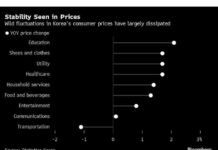California Fast Food Restaurants Adjusting to Minimum Wage Hike
As the minimum wage for fast food employees in California has been raised to $20 an hour, many fast food restaurants are making significant adjustments to cope with the increased labor costs. This change has sparked concerns among industry leaders about potential job cuts and price increases, impacting both employees and customers alike.
Effect on Menu Prices
According to a recent survey conducted by the Employment Policies Institute, a nonprofit research organization, 98% of respondents from 182 limited-service restaurants in California have already raised menu prices in response to the minimum wage hike. This increase comes at a time when prices at fast food restaurants have already risen by 47% over the past decade, as reported by USA TODAY.
Despite the price hikes, some fast food chains like McDonald’s, Taco Bell, and Jimmy John’s have introduced value meal deals to provide customers with more affordable options. However, the overall trend indicates that customers can expect to see higher prices at their favorite fast food joints as restaurants strive to maintain profitability amid rising labor costs.
Impact on Employee Hours and Opportunities
In addition to raising menu prices, many fast food restaurants are also making changes to employee hours and job opportunities in response to the minimum wage increase. The survey found that 89% of respondents had reduced employee hours, while 73% had limited opportunities for employees to pick up extra shifts or overtime.
Furthermore, 70% of restaurants had either reduced staff or consolidated positions to offset the higher labor costs. These adjustments have not only affected the bottom line for businesses but have also impacted the livelihoods of employees who may face reduced working hours and fewer opportunities for advancement within the industry.
Future of Automation and Self-Service Technology
Looking ahead, many fast food restaurants are considering increasing automation and implementing self-service technology to streamline operations and reduce labor costs. According to the survey, 60% of respondents believe that the new minimum wage law will push them towards adopting more automated solutions in the coming year.
This shift towards automation could potentially lead to job displacement for some workers, as machines take on tasks that were previously performed by human employees. While automation can improve efficiency and reduce costs for businesses, it also raises concerns about the future of employment in the fast food industry and the impact on workers who may be displaced by technology.
California Minimum Wage in 2024
The current minimum wage in California stands at $16 an hour, with some cities in the state having even higher minimum wages to account for the higher cost of living. The $20 minimum wage for fast food employees represents a significant increase from the state minimum wage, reflecting efforts to address income inequality and provide fair wages for workers in the industry.
Federal Minimum Wage
In contrast to California’s minimum wage, the federal minimum wage remains at $7.25 an hour, a rate that has not been increased in over a decade. The wage disparity between state and federal minimum wage levels highlights the ongoing debate about the need for a nationwide increase in wages to ensure that all workers receive fair compensation for their labor.
Conclusion
The minimum wage hike for fast food employees in California has sparked significant changes within the industry, from higher menu prices to adjustments in employee hours and opportunities. As restaurants adapt to the increased labor costs, customers and employees alike are feeling the impact of these changes.
Moving forward, the adoption of automation and self-service technology may further reshape the fast food industry, raising questions about the future of employment and the role of technology in the workplace. With ongoing discussions about minimum wage laws at both the state and federal levels, the debate over fair wages and economic sustainability continues to shape the landscape of the fast food industry in California and beyond.






















